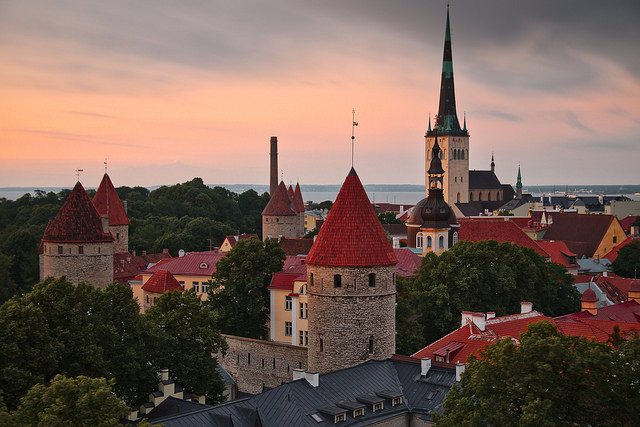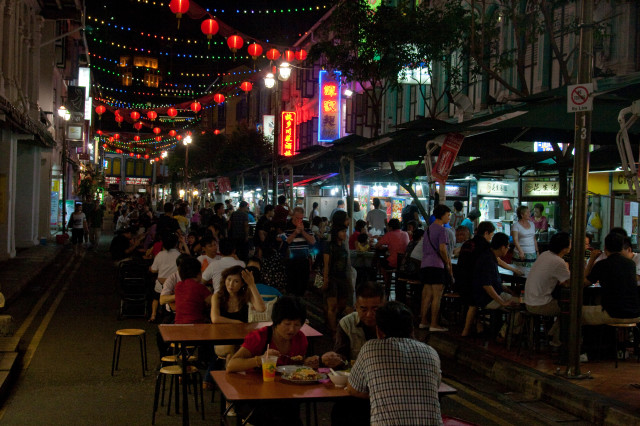While decentralization is a defining feature of blockchain, it hasn’t changed the fact that the meatbags working on projects are social creatures. New technology allows us to drift apart physically while staying close digitally, but sometimes the isolation compels us to come together again. Remember when the widespread adoption of broadband in the ’90s was the beginning of the end of face-to-face interactions? Judging by the astonishing number of tech conferences, the massive growth in co-working spaces, and the abundance of industry meetups, virtual social interaction does not replace the human need for physical connection.
Blockchain entrepreneurs and engineers tend to travel solo but settle in packs. They congregate in crypto castles by day and bars by night, in cities and hamlets where regulations are friendly and talent is concentrated. They’ve gravitated to Zug and Tallinn and Toronto, but so far there’s been little objective analysis of the relative merits or drawbacks of areas where the blockchain crowd is settling. So, for BREAKER’s first-ever comparative ranking of the top blockchain cities worldwide, I and a small academic team analyzed 11 different data points in the categories of blockchain startup activity, smart city and blockchain leadership, and regulatory friendliness.
It’s not only well-established startup cities that have emerged as early adopters of blockchain. There is much greater distribution of blockchain ecosystems across the globe compared with the Silicon Valley dominance of web 2.0. Regulatory framework is critical for blockchain startups to thrive, and if you are an aspiring blockchain entrepreneur, you may be willing to do more than incorporate an offshore company. Maybe you actually want to establish a main base of operations as well. As we know, there is a growing cadre of digital nomads and expatriate entrepreneurs happy to move to a different city if it offers a better environment for the founders and staff and a better chance for long-term success. These are the places it’s happening, along with some suggestions for prominent, local players to follow on social, and events you shouldn’t miss if you’re in town.
#10 Hong Kong
Though its overall score was matched by Vancouver, Hong Kong is home to more blockchain jobs, VCs, startups, and ICOs, and Hong Kong blockchain investors are quite active on the global stage. Numerous initiatives, like the Hong Kong Blockchain Society and The Bitcoin Association of Hong Kong, actively promote the local blockchain ecosystem. That said, the regulatory context is murky and, like the U.S., blockchain projects are essentially prohibited from selling tokens to retail investors. Five to follow: @iamjosephyoung, @boxmining, @Kris_HK, @MaxieRyan, @johnsonlau01. Don’t miss: Located in H.K.’s bustling Wan Chai district, Genesis Block is a coworking space consisting of a cryptocurrency trading center, cryptocurrency ATMs, and mining rigs for purchase.
Dubai
Photo by lensnmatter

#9: Dubai
Dubai has grand blockchain ambitions, having stated its commitment to being the world’s first blockchain-powered city by 2020. It currently has 20 blockchain projects under way in identity, visa processing, land registry, and health care records, among others (you can read more on its blockchain agenda here). Only New York has openly communicated similar intentions to becoming a blockchain city, although places like Singapore may soon follow Dubai’s lead. Five to follow: @Aisha_BinBishr, @ZeinaKaissi, @wesamlootah, @odoudin, @durov. Don’t miss: Future Blockchain Summit is an annual blockchain conference sponsored by Smart Dubai, the government initiative to transform Dubai into a smart city.
#8: Toronto
Toronto is the banking capital of Canada—and it’s also a global thought leader in blockchain technology. It’s home to the Blockchain Research Institute, a think tank with researchers based in Zurich, Sao Paolo, and Mumbai, as well as Blockchain Canada, a nonprofit connecting the Canadian blockchain ecosystem. While Toronto does not dominate the list of cities with the highest number of ICOs issued, it’s Vitalik Buterin and Ethereum’s hometown, so it’s central to the global blockchain community. And other projects like Aion, Tendermint, Jaxx, and Paycase are also in the works. Then there’s the AI angle. “The true tech strength of Toronto is its AI ecosystem,” says Eden Dhaliwal, head of cryptoeconomics at Outlier Ventures. “This convergence of blockchain and AI makes Toronto fertile ground for many of the new digital economies of the future.” Five to follow: @dtapscott, @alextapscott, @wmougayar, @Anne_Connelly, @IlianaOV. Don’t miss: The Blockchain Futurist Conference, featuring talks and panels with Larry King and Roger Ver, a cryptocurrency bootcamp, and an ICO competition.
Tallinn
Photo by Rob Oo

#7: Tallinn
Tallinn is one of two little towns that could in this ranking. Estonia has catapulted itself on the global stage as a digital nation by proactively supporting blockchain startups and embracing blockchain in its own operations. And Tallinn, the capital of this country of less than 2 million people, has benefited greatly. The e-residency program allows anyone to incorporate a digital enterprise in Estonia, without ever having set foot there. And the Estonian Cryptocurrency Association, a nonprofit in Tallinn, has taken up the charge to help promote the ecosystem locally and globally. Five to follow: @TaaviRoivas, @sikkut, @kaidiruu, @MartenKaevats, @ruubel. Don’t miss: Moontec, an annual conference at the Tallinn Creative Hub, a center for innovation in the heart of the city. Past speakers include Ben Goertzel and Kavita Gupta.
#6: Berlin
The Berlin bar Room 77 was the first brick and mortar location in the world to accept bitcoin, and the city continues to lead in blockchain today, with strong scores in regulatory friendliness and government transparency. “Berlin has a naturally subversive personality with a societal-good bent, from the hacker spaces of the ‘90s to Room 77,” says Trent McConaghy, Berlin resident and founder of Ocean Protocol and BigchainDB. “This has carried over more broadly in blockchain thinking; many of the projects in Berlin have a bias as infrastructure for society.” Berlin’s highly skilled workforce, relatively low cost of living, and status of best city in the world for millennials mean it has a long history of attracting entrepreneurs. Berlin also has a thriving fintech startup scene and a growing number of ICOs. Five to follow: @koeppelmann, @Falkvinge, @trentmc0, @feindura, @jutta_steiner. Don’t miss: Hoping to become the blockchain hub of Europe, Full Node is a coworking space exclusively for blockchain-related startups and entrepreneurs.
#5: San Francisco
The Bay Area has the highest number of incorporated ICOs in the world, but American cities will be hard pressed to rise any higher on this list as long as the uncertainty about legal implications for taking retail investment from U.S. residents remains. Even so, enthusiasm for blockchain abounds. Some notable VCs, like Tim Draper, are outspoken hodlers and crypto evangelists (quite literally: Draper busted out a cryptocurrency rap at a recent conference in Amsterdam). The ICO market is chipping away at the dominance of the venture capital-driven approach to financing tech startups. And because art must imitate life, this became a major plot point in Silicon Valley, the show, earlier this year. Five to follow: @brian_armstrong, @SatoshiLite, @ljxie, @starkness, @kate_haun. Don’t miss: Decentralized Fridays, weekly drinks with Dogecoin creator Jackson Palmer at local dive bar Thee Parkside.
#4: New York
Since the earliest use cases for blockchain technology were in fintech, it’s not surprising that a global financial hub like New York is also home to many blockchain startups. One heavyweight is ConsenSys, the Joseph Lubin-led, Brooklyn-based spinoff of the Ethereum Foundation. The company, with more than a thousand employees, is focused on supporting scalable blockchain startups. Its presence has served as a major pull for others in the industry—New York received the highest score of all the cities for its number of blockchain professionals. The city is making efforts to help the area evolve into a blockchain mecca, like the launch, announced in May, of a Blockchain Resource Center. But culture is also a draw. In May, New York hosted both CoinDesk’s Consensus (which raked in up to $17 million in ticket sales), and the Ethereal Summit, which fancies itself the “SXSW of blockchain” and was held at the funky Knockdown Center in Queens. Together, the events attracted more than 8,500 people. Five to follow: @barrysilbert, @Melt_Dem, @cburniske, @ethereumJoseph, @AmberBaldet. Don’t miss: Blockchain Week NYC, when dozens of blockchain-related conferences and events converge (some more debaucherous than others).
#3: Zug
The tiny Swiss town (pop. 29,000) nicknamed “Crypto Valley” has taken on outsize importance given its status as both a tax haven and home to the Ethereum Foundation and more than 450 blockchain-related startups and organizations. Switzerland offers generous regulatory and tax treatment for blockchain startups, and while Zug tied with New York points-wise, it gets the edge for its much-friendlier regulatory environment. The picturesque hamlet has become a talent and research center in the industry, though its size hurt scores in categories like the number of VCs or blockchain-related jobs. Still, the community that does exist likes to rub shoulders. The Crypto Valley Labs blockchain space and its partner Trust Square space in Zurich allow blockchain entrepreneurs access to both spaces. Even the Zug government is getting in on the action: it recently created a blockchain identity solution, and accepts bitcoin for some government payments. “Switzerland is the jurisdiction of choice for many high-quality projects,” says Mathias Ruch, managing partner at Lakeside Partners. “What they all have in common is a professional setup, a solid business case, and a clear implementation strategy.” Oh, and it’s 20 minutes by train from Zurich—and the views along the way are amazing. Five to follow: @EricVoorhees, @MihaiAlisie, @licuende, @JohnLilic, @Mona_El_Isa. Don’t miss: Crypto Valley Conference is an annual blockchain conference with a serious, academic focus. Past speakers include Stefan Thomas and Emin Gün Sirer.
Related: Crypto-Curious in Singapore: A Visit to Asia’s Fintech Hub
#2: London
One unintended upside of Brexit may be that it encouraged the U.K. government to throw more support behind London’s blockchain ecosystem to offset lost opportunities in the traditional financial services industry. The U.K.’s cryptocurrency task force, announced in March, aims to regulate and encourage growth, and should serve as a stabilizing factor in a city that’s already home to the world’s second-highest number of blockchain startups. One challenge for London: It ain’t cheap. “Despite reducing the bureaucracy to start up here, London is experiencing somewhat of a brain drain as a result of the cost of living, with many aspiring entrepreneurs moving to more affordable startup hubs like Berlin,” says Jamie Burke, the founder and CEO of Outlier Ventures. Five to follow: @VladZamfir, @stephantual, @nictrades, @SusanneChishti, @rhian_is. Don’t miss: Crypto Investor Show, the cryptocurrency and blockchain conference in both London and Manchester.
Singapore
Photo by Kimon Berlin

#1: Singapore
Singapore’s ambitious Smart Nation strategy seeks to transform this former fishing village into a living laboratory of innovation, and that type of proactive thinking is one reason it’s this year’s world leader in blockchain. Though other cities may be better known for their blockchain scenes, Singapore boasts the leading score in our smart city category, and strong numbers in both the number of ICOs and blockchain-related startups. Its government is considered more transparent and business-friendly than others, and it boasts blockchain-friendly regulations to boot. It’s home to several new blockchain co-working and incubation spaces, including NPower and Longhash. Its GovTech office is exploring a handful of blockchain use cases, while the Monetary Authority of Singapore has pioneered a decentralized inter-bank payment and settlements solution.
Low taxes—there are no capital gains—mean the country was flush to begin with, and that money seems increasingly to be flowing to blockchain projects. Singapore benefits from its proximity to China, whose entrepreneurs flock there for its friendlier regulations. And it probably doesn’t hurt that English is a national language, making it an easy choice for Western entrepreneurs and investors. Finally, thanks to its famously rigid approach to law and order and burgeoning middle class, it feels like a safe place to get rich on crypto. “It’s easy to be a billionaire here,” Kenneth Bok, the organizer of De/Centralize, recently quipped to BREAKER. Five to follow: @loi_luu, @ladyxtel, @valyappal, @ansonzeall, @ginaheng80. Don’t miss: The De/Centralize conference at the iconic Marina Bay Sands resort.
—
Boyd Cohen, Ph.D., is the co-founder of IoMob and the Blockchain Cities Alliance, dean of research at EADA Business School, Barcelona, and the author of Post-Capitalist Entrepreneurship. View the raw data for the rankings here.
The methodology
The most controversial part of ranking the world’s top 10 blockchain cities may have been selecting the cities chosen for consideration. Instead of using standard eligibility requirements such as population size, we used a type of snowball methodology to create a list of locations with a reasonable chance of making a top 10 list. In the end, 18 cities were identified as potential candidates. The primary sources of data for city selection included:
- Token Report’s ranking of top 10 cities based on headquarters of projects completing a token-generating event, or ICO.
- The Global Startup Ecosystem Report 2018 (particularly blockchain ecosystems, starting on page 50).
- Independent research to identify other top cities based on ICO headquarters, via Token Market’s database.
Indicator Selection and Weighting
Indicators were grouped into three separate categories:
- Blockchain startup activities: 50 total points
- Smart and blockchain city leadership: 20 points
- National context: 30 points
The following are descriptions for each category, the representative indicators, and the weightings:
Blockchain startup activities:
- Number of registered blockchain/ICOs in the city (source: Token Market), 10 points
- Number of blockchain professionals (source: LinkedIn), 10 points
- Number of blockchain startups (source: Crunchbase), 10 points
- Blockchain VCs, intermediaries (sources: Angel.co, Crunchbase, Cointelegraph, Google search, conference presenters), 7 points
- Meetups per month (source: Meetup.com), 7 points
- Blockchain jobs (source: LinkedIn), 3 points
- Startup genome leader (source: Startup Genome), 3 points
Smart and blockchain city leadership:
- Number of smart blockchain services supported by the city, 5 points
- Blockchain strategy for the city, 10 points
- Smart cities ranking (sources: Easypark, Juniper, Cities in Motion Index), 5 points
National context:
- Favorable regulation, 20 points
- Transparency, (source: Transparency International), 5 points
- Best places to do business (source: World Bank), 5 points
The city with the best/highest performance on each topic was assigned a maximum point score for that indicator; remaining cities were compared relative to the leader.